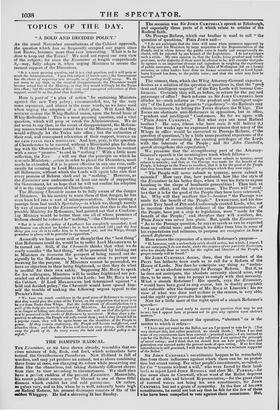TOPICS OF THE DAY.
"A BOLD AND DECIDED POLICY."
As the usual November consultations of the Cabinet approach, the question which has so frequently occupied our pages since last Easter, becomes more than ever interesting. What is to be done to keep out the Tories ? We need not repeat our own view of the subject ; for even the Examiner at length comprehends it,—nay, fully adopts it, when urging Ministers to secure the earnest support of the Dissenters.
"It is a most pressing question, and it is a vital question, and it will prop or crush the Administration. Upon this subject (Church-rates) the Government has the choice of acquiring new strength, or of casting itself away. We do not mean to say that, in the event of disappointment, the Dissenters would become actual foes of the Ministry, or that they would willingly let the Tories into office; but the extinction of their zeal, and consequent relaxatton of their support, would be no less fatal than hostility."
Here is part of "a plan of action "for sustaining Ministers against the new Tory policy ; recommended, too, by the very same argument, and almost in the same words, as we have used when urging the adoption of a whole plan. Will Lord MEL- BOURNE restore the Whig-Radical union, upon the broad basis of Whig-Radicalism ? This is a most pressing question, and a vital question, which will prop or crush the Administration. We do not mean to say that, in the event of disappointment, the Reform- ing masses would bcoome actual foes of the Ministry, or that they would willingly let the Tories into office; but the extinction of their zeal, and consequent relaxation of their support, WOULD BE NO LESS FATAL THAN HOSTILITY. And bow, pray, is the question of Church-rates to be carried, without a Ministerial plan for deal- ing with the Obstructive Lords ? Will the Dissenters be content with a mere "promise." to end in "nothing?" With a little more reflection, the Exa,, :r will see that the principle on which he counsels Ministeria: action in order to please the Dissenters, must needs be extended, if it is to prove effective in any one case, suffi- ciently for securing to Lord MELBOURNE the zealous support of all Reformers, without which the Lords will again take care that every promise of Reform shall end in "nothing." However, as the Examiner now understands at least our mode of supporting the Government, let us hope that he will not confine his adoption of it to the single question of Church-rates. The Morning Chronicle seems to be fully aware of the danger of Ministers. In his anxiety to warn them of that danger, he has even been led into a sort of misrepresentation. After quoting a passage from last week's Spectator,—in which we, though merely by way of answer to the Examiner's assertion that this is the best possible Ministry for Reformers, had pointed out that a Conform- 1.1g Ministry would be better than one all of whose promises of -Reform should be reduced to "nothing,"—the Chronicle says- " But it is said the policy of Lyndhurst has completely succeeded ; Lord Melbourne can advance no further; he is beat to a stand still • and the best Siting you can do is to suffer him to be turned out, and the Whigs, though powerless in place, will be powerful in opposition." Assuredly we have never said or thought that the "best thing" that Reformers could do, would be to suffer Lord MELBOURNE to be turned out. Still, if the Chronicle thinks that what we do really consider "the best thing," will be promoted by holding out to Ministers in terrorem the prospect of being turned out de- signedly by the Reformers, he is welcome even to pervert our meaning for the purpose. If Ministers cannot be persuaded, we have no objection to their being frightened, so that they do what is needful for their own safety. Supposing Mr. RICE to speak for his colleagues, Ministers will be neither frightened nor per- suaded out of their submission to the Lords: but Mr. RICE is not the Cabinet. If Lord MELBOURNE had determined against "a bold and decided policy," the Chronicle would have spared him- self the trouble of making the following urgent appeal to the Premier's fears.
"We have too much confidence in the good sense of Reformers to suppose that they would play the game of the Tories, on the supposition that more is to be got from Tories than Whigs. But the indications of dissatisfaction in a part of the body are not to be neglected by Ministers. An army not employed is in danger of falling into dissensions. Ministers will see that discipline can &est be preserved in the ranks of Reformers by movement. If they show a ills- position to advance, the People will rally round them and if they should fall in a popular cause, they will be again borne on the shoulders of the People to power. if they remain stationary, the People will become indifferent, and abandon them; and then the Tories will have an easy victory, with time to rasp the fruits of it. In every sense, the bold and decided policy is Me safest."


























 Previous page
Previous page